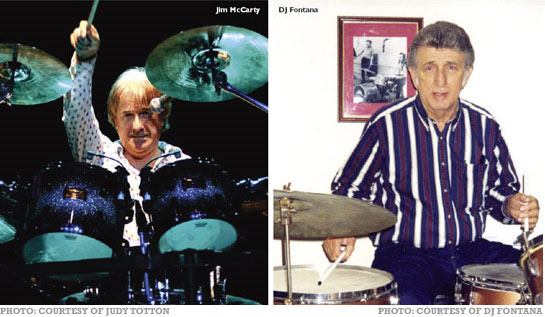
JIM MCCARTY
Born July 25, 1943 in London, McCarty grew up in Tottington, England, and began playing in the Metropolis Blues Quartet, which changed its name to the Yardbirds in 1963. At the time, McCarty was working at a stockbroker’s office by day and playing music at night. He used to see the Rolling Stones play their regular gig at the Crawdaddy club in nearby Richmond, and when the Stones moved on, McCarty and the Yardbirds took their spot.
By their 1964 live album, Five Live Yardbirds, guitarist Anthony “Top” Topham’s parents had forced him to leave the group over concerns that he was missing too much school, and lead singer Keith Relf’s schoolmate, Eric Clapton, had taken over the lead guitar duties. “Eric hasn’t done badly,” McCarty said. “He based his style on great blues players, like Buddy Guy and people like that. It’s amazing that he was just playing with us as one of the band, and now he’s so huge. We were listening to Bob Dylan, who was like the god, and now Clapton is on the same level.”
The revamped lineup developed their own sound, playing traditional blues and R&B tunes with a heavier, amplified style, emphasizing the lead guitar and solo improvisations. In 1965 they had their fi rst hit, “For Your Love.” After For Your Love, Clapton left the Yardbirds to join John Mayall & the Bluesbreakers, and McCarty welcomed his future co-comedian, Jeff Beck to the group. “Clapton, Beck and Page were all great players,” McCarty said. “I preferred Jeff because he was completely spontaneous, off-the-wall, so really out there, almost completely non-derivative. Jeff and I would mess about; have humor.”
Beck only stayed in the band for a year and a half, but would have a disproportionately large influence on rock guitar, lending his off-the-cuff playing style to hit songs like “The Train Kept A-Rollin’” and “Heart Full of Soul.” Before Beck succumbed to stress-related exhaustion he was joined, and later replaced, by a local session guitarist named Jimmy Page.
“Jimmy was great at creating great riffs; brilliant,” McCarty said. “He was a lot more businesslike in the way he played, but he got wilder. He was coming out of playing sessions, still very conscious about doing what we wanted, which he was used to doing, but he could certainly make up some good riffs. He was very conscious of making money, much more than Jeff, who just wanted to play. Maybe Jeff had that underneath, but he never really showed it.”
The Yardbirds began to dissolve shortly after Page joined, with McCarty leaving in 1968. After leaving the band, McCarty and Relf formed the band Renaissance, which produced two albums, Renaissance, in 1969, and Illusion, in 1971, before McCarty left.
McCarty continued to write songs for Renaissance after leaving, even reforming the band at one point under the name Illusion. In 1995, he joined a new version of the Yardbirds and recorded the album Birdland in 2003, with guests Brian May, Joe Satriani, Slash and Steve Vai. McCarty continues to tour with the re-formed Yardbirds.
DJ FONTANA
DJ Fontana spent the early part of his career playing behind a curtain, before stepping out and providing the beat for the King of Rock ‘n’ Roll for 14 years.
Born March 15, 1931, in Shreveport, Louisiana, Dominic Joseph Fontana got his start playing for T. Tommy Cutrer, a local radio personality and country music singer. He also drummed for local strip clubs at this time, an experience that helped him shape the sound of rock ‘n’ roll.
Fontana became the house drummer for the Louisiana Hayride, a radio (and briefly television) show, which ran from 1948 to 1960, and showcased famous performers and served as a proving ground for new acts. Its stage was graced by the likes of Hank Williams, Floyd Cramer, Johnny Horton, George Jones, Johnny Cash and many others. In 1954, a year after Fontana was hired permanently, a young singer named Elvis Presley was booked to perform.
The country performers who played the Hayride rarely wanted a drummer, and the audience wanted one even less, so Fontana spent most of his time sitting around hoping someone wanted him to play, and when they did, he had to play behind a curtain. But Presley’s band members, Scotty Moore and Bill Black, knew Fontana, and asked him to play that night.
Presley’s songs were poorly received, but the producers took a chance and signed him to a one-year contract to appear regularly on the show. When he left a year later, he took Fontana with him for the next 14 years, recording over 400 songs together. Fontana’s drumming set the standard for rockabilly and rock ‘n’ roll, and it was a style he learned in strip joints where the dancers wanted the drummers to “catch” the movements of their hips and legs. Fontana watched Presley gyrate on stage and realized that his stripper rhythms were a perfect fit.
After splitting with Presley for good in 1969, Fontana settled in Nashville, where he worked as a session player. In 1997, Fontana and Moore released the album All the King’s Men, which featured Keith Richards, Joe Ely, Cheap Trick, Steve Earle, Joe Louis Walker, Jeff Beck, Ron Wood and others. Fontana works, but said “I don’t do session work anymore. I don’t like the way they’re doing it today where one guy comes in one day and then somebody else the next, then the vocalist comes in. I won’t work with click tracks. You have to have the other musicians there, where you can see and feel them, and interact. That’s what makes the magic.”
Inducted into the Rock and Roll Hall of Fame in April 2009, Fontana’s award was presented by Max Weinberg.
* * *
Elmore: What are you listening to right now?
Jim McCarty: It’s pretty eclectic. From Ry Cooder to Howlin’ Wolf, all the way to jazz and classical music, like (Claude) Debussy. I’ve always liked all sorts of music. I like Ry Cooder because he does interesting collaborations. I always loved playing rock ‘n’ roll drumming. For a modern band, that’s really difficult. Some bands are pretty good, like the Red Hot Chili Peppers.
DJ Fontana: I listen to the radio and country music. I still like Merle, I’ve always liked country music. And Garth Brooks, he’s a terrific musician and really started the renewal of country music.
EM: What was the first record you ever bought?
JMcC: A 78, Humphrey Lyttelton, the trumpeter, “Bad Penny Blues.” I remember I liked Skiffle, which was quite big in England. I was with my mom, who said, “You really like this?” It was like a joke. I couldn’t understand why she was laughing.
DJF: I really don’t buy music. People will send me copies of sessions I played on, or things they’re doing.
EM: Where do you buy your music?
JMcC: Totally on Amazon. I live in France and it’s easier.
EM: What was the first instrument you played?
JMcC: I messed around on piano. My grandmother had a piano and played at functions—she was very good.
DJF: Drums. It’s the only thing I play. I’d like to play piano, but I never got around to it, I don’t have one in the house—there’s no room.
EM: What brought you to the instrument you now play?
JMcC: I started out in the Boys Brigade, a military version of the Scouts, with uniforms, and I played the snare drum in the band. I sort of got quite good at it, and I’d play a thing and then all the other drummers had to play what I played. I started when I first heard a band. I was 14 or 15, and there was a band rehearsing in their sitting room round the corner where I lived. They were really loud and I was sort of bowled over. In a band in school, we’d play Buddy Holly & the Crickets, Johnny Cash, the Everly Brothers and we’d play in the school dances. People were ballroom dancing, and then they’d say “OK now we’ve got some rock from the school band!” and everyone would go mad.
DJF: I was in the high school drum and bugle corps and also in a concert band in high school in Shreveport, where we had a great teacher. When I was in high school, in the early ’50s, a cousin played the drums—he was the only one around who had a set.
EM: Who would you like to write with that you haven’t?
JMcC: Burt Bacharach, John Lennon and Paul Simon. Any of those three would do.
DJF: I don’t compose. I can’t read or write music. Paul McCartney is a great writer, but he doesn’t read music either, but I don’t compose.
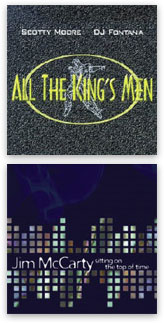
EM: What musician influenced you most?
JMcC: The Shadows, so Tony Meehan, then Brian Bennett took over. Later, Hal Blaine, then the blues drummers. I learned the most from the people I mentioned, and the Crickets’ drummer, Jerry Allison, DJ Fontana and then the drummer for Jerry Lee Lewis (JM Van Eaton). There used to be these movies called Jamboree or something, and they’d consist of American rock ‘n’ roll people playing a song, one after another. Of course I love the jazz drummers as well, Joe Morello from Dave Brubeck, Art Blakey.
DJF: Buddy Rich, Shelly Manne with Stan Kenton, Louie Bellson. Of the current drummers, Max Weinberg, with Springsteen’s band and on Conan. He doesn’t do crazy stuff, he just keeps that great rhythm section.
EM: What was the song or event that made you realize you wanted to be in music?
JMcC: The song that really grabbed me was “Bright Lights, Big City,” by Jimmy Reed. I was working at a stockbroker’s. I was at school with Paul Samwell-Smith, the bass player in the Yardbirds. He was in the school band with me, and after we left school I bumped into him one day, and he said, “Come ’round for a cup of tea and have a listen to this new record I got, it’s Jimmy Reed live at Carnegie Hall.” I’d never really heard music like that. It had so much emotion and feeling, and it was rocky at the same time. I thought, “This is the kind of music I’d love to play.”
DJF: I never really made that decision. I just kept playing and getting paid. If it had stopped, I’d have done something else. Shreveport wasn’t a big town then, and a few bands would play and they’d ask me to play with this band or that, and I wound up playing at the Louisiana Hayride, which is where I got involved with Elvis. They didn’t like him there.
EM: Who would you like in your rock ‘n’ roll heaven band?
JMcC: Oh, wow. I imagine Jeff Beck would be on lead guitar. Maybe Stanley Clarke on bass, Donald Fagen on piano. Maybe have a percussionist as well—I’d play the drums, but maybe Shelia E. would play some. Maybe Paul Butterfield on one or two cuts. Singer? For a rock band, maybe Paul Rodgers, or Freddie Mercury? Or maybe Howlin’ Wolf. Those are three different bands—you can see I’m not stuck in one phase. (If you could have any kind of a band, what would you have?) I might have a bluesy band, with Howlin’ Wolf. I wouldn’t have Donald Fagen, then, would I? I’d have to have Johnnie Johnson. I’d keep Jeff in, that’d be great.
DJF: For a whole band, I’d pick the Beatles. I spent the day with George Harrison at his house, and we talked for five hours and then he and his wife and Scotty Moore and I went out to dinner. If they’d let me, I’d sit in for a number or two. If I were to make up a band, I’d have Floyd Cramer on keyboards. Joe Osborn on bass. Jeff Beck and Jimmy Page on guitar—they were with me when I was inducted in the Rock Hall of Fame. Elvis and Roy Orbison on vocals—what a voice Roy had.
EM: What’s your desert island CD?
JMcC: Just one? Oh, dear. Classical. Debussy or Rachmaninoff. Or maybe Pet Sounds, or The Best of Howlin’ Wolf, or even Jimmy Reed at Carnegie Hall. Or maybe Ry Cooder—his African album.
DJF: That Ray Charles country album, or the Beatles’ Sgt. Pepper.


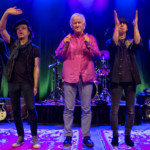
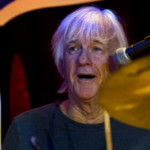
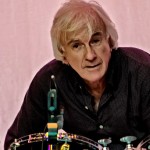


Be the first to comment!